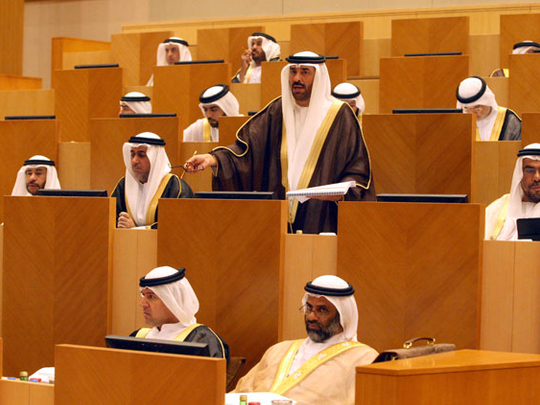
Abu Dhabi: Chairpersons and the majority of board members of public joint stock companies must be Emiratis, according to a draft companies law being debated by the Federal National Council.
Members of the House on Tuesday insisted that the bill submitted by the government and which initially stated that the majority of members of the board of PJSCs must be citizens, be changed to make the condition cover chairs of these companies.
Sultan Saeed Al Mansouri, Minister of Economy, agreed to the change, which was voted for unanimously.
Under the draft law, the founders of a Public Joint Stock Company are obliged to subscribe to no less than 30 per cent of the issued capital of the company.
The bill states that a person may serve on no more than five public company boards at a time, a clause rejected by many members of the council, who demanded that a member be allowed to serve on a maximum of two boards.
But the minister said the UAE’s law adopted international best practices, which entitles members to serve on four boards in the US and Singapore, 10 boards in Malaysia and an unlimited number of boards in the UK.
The House eventually passed this clause and will complete a review of the draft law on Wednesday.
The draft law enforces strict corporate governance standards and procedures on PJSCs in accordance with international standards and practices. The Ministry of Economy will issue a decree setting out corporate governance requirements and a framework for PJSCs. Banks, finance companies, financial investment companies, exchanges and money brokerages are excluded.
Overwhelming opposition by the House to full foreign ownership of companies yielded an immediate response with the Government scrapping a proposal that would have eased the tight controls on foreign ownership of companies.
Members of the House unanimously rejected a clause in the draft companies law which would have allowed foreigners to fully own certain companies after a decision of the Cabinet.
They said the move would endanger the UAE’s national security, citing the country’s population structure in which “Emiratis account for less than 10 per cent”.
“If the move had been passed citizens would have left nothing to own and our parliament with its weak powers would not be able to change such a law” said Dr Abdul Rahim Al Shaheen, a representative from Ras Al Khaimah.
Many members insisted the move be scrapped because they said it would threaten national security and give foreigners the upper hand in strategic sectors.
The Minister of Economy, told the House last week he understood the fears of the FNC members and that a new investments law would address this issue. “The clause of foreign ownership would now be included in a draft foreign investments law, because it is much more suitable, and to review the conditions and terms to be applied,” Al Mansouri said.
The draft law will not apply to companies excluded by a Cabinet resolution. These include companies wholly owned by federal or local authorities or any entities wholly owned by such companies, companies in which the federal or local authority, or any establishment, authority, department or company controlled or held by any of the foregoing (directly or indirectly) holds at least a 25 per cent shareholding and which operates in oil exploration, drilling, refining, manufacturing, marketing or operating in the energy sector in power generation, gas production, or water desalination and distribution.
The law states that the Cabinet can issue a decree outlining the conditions for registering companies operating in UAE free zones that wish to carry out their business activities outside the free zone, in the mainland (onshore) UAE. These decrees will open up the jurisdiction for free zone companies wishing to also operate in the UAE outside the free zones.












